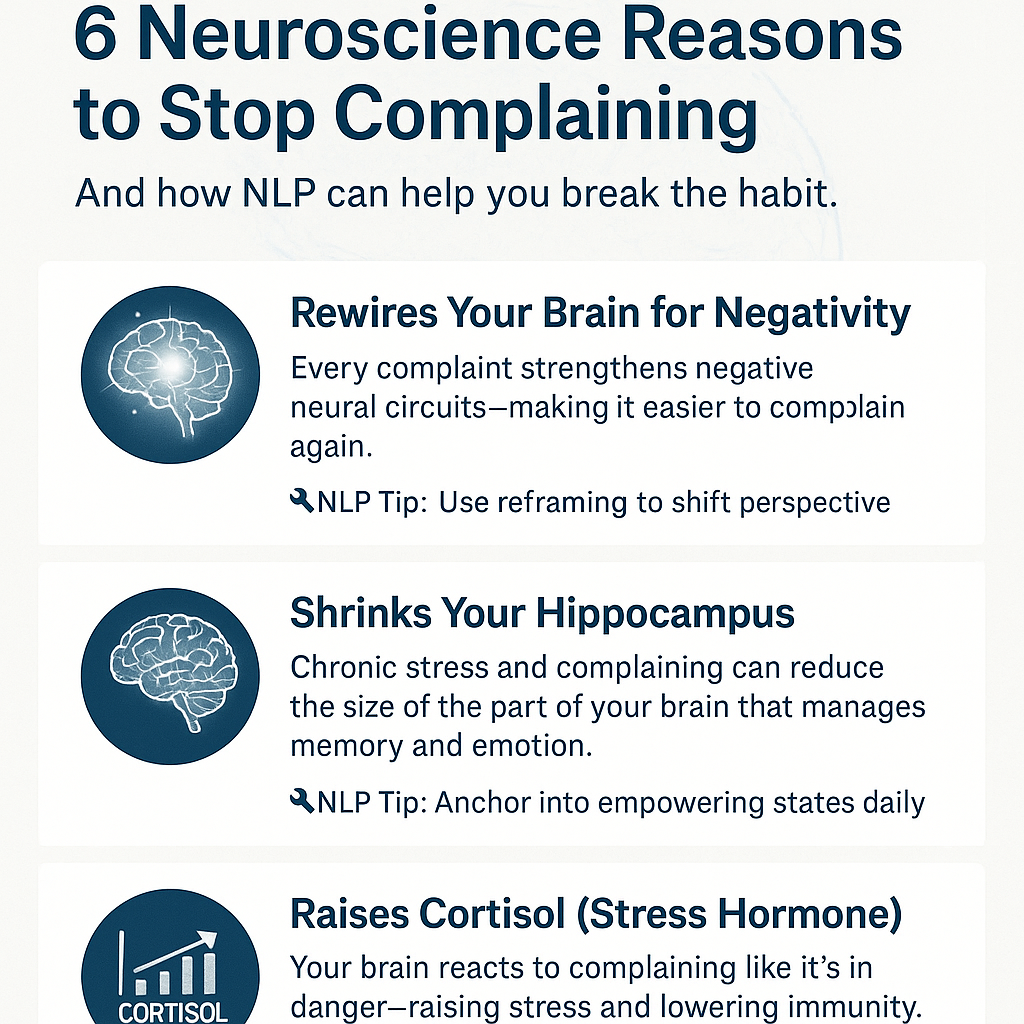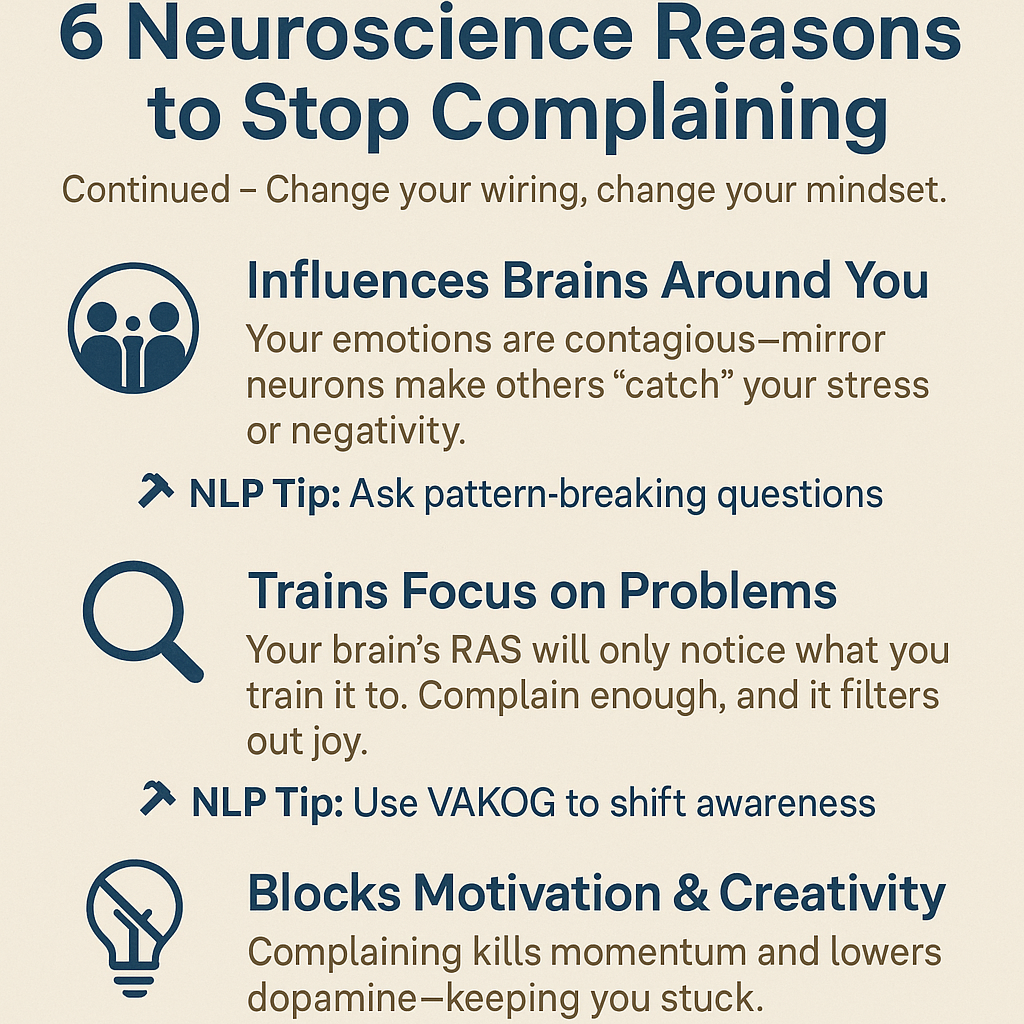
6 Neuroscience Reasons to Stop Complaining

We’ve all done it..
You vent about your job. Rant about traffic. Moan about the weather.
But what if complaining is doing more harm than good—not just emotionally, but physically?
According to neuroscience, the more you complain, the more you train your brain to keep doing it. And worse… it rewires your mind for negativity.
The good news?
Once you understand what’s happening in your brain, you can break the cycle—and Neuro-Linguistic Programming (NLP) offers powerful tools to help.
Here are six science-backed reasons to stop complaining today.
1. Complaining Rewires Your Brain for Negativity
Neuroscience shows that your brain strengthens the neural pathways you use the most.
When you complain repeatedly, you reinforce a negative thinking loop.
Neurons that fire together, wire together.
That means you’ll start seeing problems even when they’re not there.
NLP Tip: Use reframing to find a more resourceful meaning in any situation.
2. It Shrinks Your Hippocampus (Seriously)
A study from Stanford found that constant complaining can shrink the hippocampus—the area of your brain responsible for memory, learning, and emotional regulation.
Chronic negativity literally changes your brain structure.
NLP Tip: Anchor yourself into empowering emotional states when facing daily stressors.
3. It Raises Cortisol (Your Stress Hormone)
Each time you complain, your body releases cortisol, your primary stress hormone.
This increases blood pressure, weakens your immune system, and raises your risk of anxiety and depression.
Your brain interprets complaining as danger—and activates your fight-or-flight response.
NLP Tip: Use state management techniques like visualization or breathing anchors to shift instantly

4. You Influence the Brains Around You
Ever feel drained after being around a chronic complainer?
That’s not just in your head—mirror neurons in your brain sync up with theirs.
Complaining is socially contagious.
You literally spread the emotional state you project.
NLP Tip: Interrupt negative patterns in conversations with a subtle question like: “What else could be true here?”
5. It Trains Your Focus on What’s Wrong
Your brain has a Reticular Activating System (RAS)—a filter that decides what to notice.
Complain enough, and your RAS gets trained to only spot what’s going wrong.
So you start ignoring solutions, opportunities, or even simple joys.
NLP Tip: Use the VAKOG model to shift sensory awareness to positive sights, sounds, and feelings.
6. It Blocks Your Motivation & Creativity
Chronic complaining reduces dopamine and weakens the brain’s ability to problem-solve creatively.
You get stuck in “why me?” instead of “what now?”
You lose momentum. You lose hope.
NLP Tip: Use outcome language instead of problem language.
Ask: “What do I want instead?”
Conclusion: Change Your Wiring, Change Your World
Your brain is listening to everything you say—even when you’re joking, venting, or “just being honest.”
The more you complain, the more your mind expects the worst.
But the more you interrupt the cycle, reframe your perspective, and speak with intention—the more resilient, positive, and mentally powerful you become.
NLP gives you the tools to do exactly that.
Kickstart your journey with Ashton Training Academy!
Ready to understand how your brain really works—and how to take charge of it?
At ATAP, we offer:
> NLP coaching sessions to eliminate mental and emotional blocks
> Practical NLP workshops for professionals and leadership teams
> Corporate training programs to boost performance, mindset, and communication
We don’t just teach NLP—we help you live it.
Ashton Training Academy - Transforming thinking. Empowering Leaders. Healing the world.

Klang Office:
32, Lorong Angsa,
Taman Berkeley, 41150 Klang, Selangor
Subang Jaya Office:
39, Jalan SS 17/1A, Ss 17, 47500 Subang Jaya, Selangor
© Ashton Training Academy PLT ( LLP0003676-LGN) 1997 - 2023. All rights reserved.


